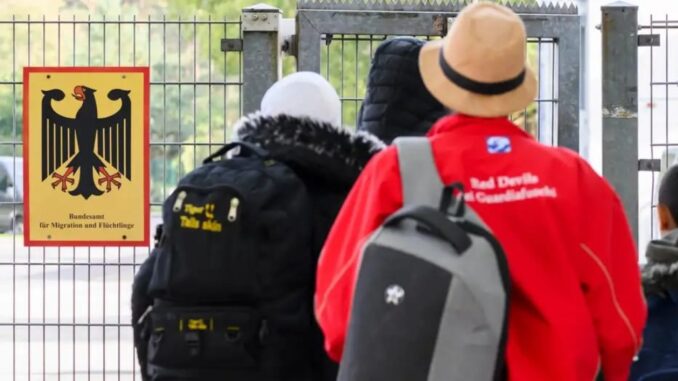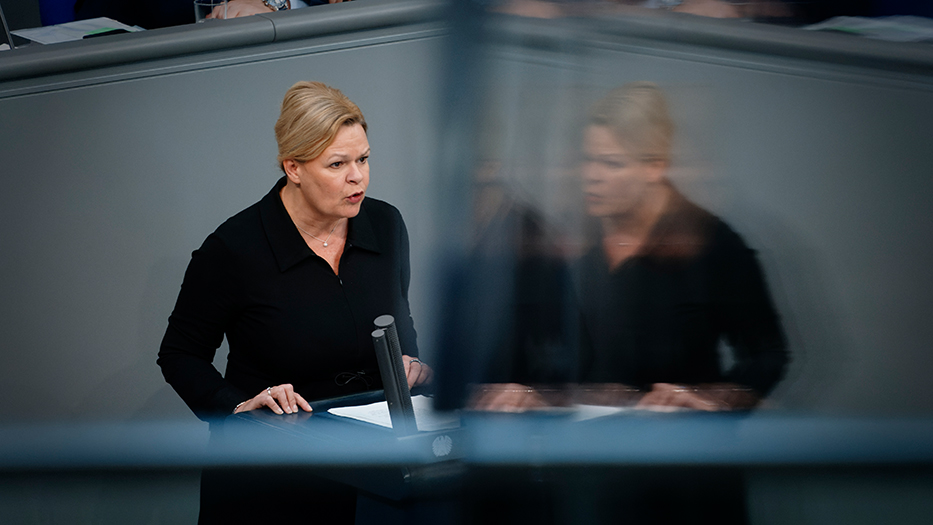
Despite harsh criticism, the traffic light coalition[1] passed the controversial Repatriation Improvement Act that facilitates deportations by restricting the basic rights of asylum seekers. It is finally a drastic tightening of immigration policy.
By Carolina Menéndez Trucco
The recent wave of marches against the right since it became known that its activists were considering the mass deportation of millions of immigrants and the consequent call for solidarity do not work if Germany then approves mass expulsions. Faced with the imminent danger of the far-right plans, Chancellor Scholz and Foreign Minister Baerbock took to the streets last Sunday the 14th among more than 10,000 protesters. It would seem incredible that four days later they announced a radical change in their immigration policy, adopting the politics of the right. “We must finally deport on a large scale those who have no right to stay in Germany,” said German Chancellor Olaf Scholz in an interview with the magazine Der Spiegel, setting the tone for 2024. The Bundestag -the German federal parliament- has taken a regressive step by approving on Thursday, January 18, the Return or Repatriation Improvement Act, legislation that marks a before and after in the handling of asylum requests and deportations. As a result, assistance to refugees is criminalized.
The Government wants to repatriate asylum seekers with rejected requests more quickly and give more powers to the police to prevent escapes. Until now, deportations have often failed at the last moment because those affected cannot be found. For this reason, the maximum duration of detention upon departure will be extended. In other words, the Scholz cabinet will begin to deport “on a large scale” people who continue to reside in the country despite not having the right. Those who remain in an irregular situation may be deported more quickly. The decision has generated intense debates both nationally and internationally. In this context, stricter measures are introduced, including the possibility of police raiding homes to search for people trying to avoid deportation. In the future it will no longer be necessary to even announce the deportation of those detainees who are forced to leave the country.


German rigor
The Repatriation Improvement Act (Rückführungsverbesserungsgesetz) only attenuates what it commits in the words of its title. “With our legislative package, we are ensuring that people without the right to remain have to leave our country more quickly,” said SPD Interior Minister Nancy Faeser proudly on Thursday. The new regulations extend the maximum duration of detention pending deportation from ten to 28 days. According to legal assessments, detention for a release period of 28 days could be unconstitutional, since for those affected detention is barely different from imprisonment. “Some of their cell phones are confiscated and they are locked in a cell for many hours a day,” explains lawyer Peter Fahlbusch to Welt newspaper. Wiebke Judith of the human rights organization Pro Asyl, for example, stated that the federal government is sacrificing the rights of those affected by “right-wing populist discourse.”
The government’s arguments? The main reason for the measure is so that the authorities can guarantee the deportation of foreigners who are forced to leave the country, avoiding escapes. To do this, a series of innovations will prevent people from hiding before they can be deported. Then, people detained pending deportation can receive legal assistance in the future. Currently there are no mandatory lawyers for those affected. The most rigid wing argues that these measures are necessary to maintain order and security in the country. Last but not least, minors will thus be “protected” from these processes. The inconsistency and hypocrisy of the German government reached its limits this week. “These restrictive measures are necessary so that we can continue to live up to our humanitarian responsibility for the people we have to protect from war and terror,” Faeser said, justifying the plan. According to the government, in this way social acceptance of refugee protection can be maintained. In short, a concession to the anti-immigrant right and extreme right.
Escape and asylum: a pendulum
According to the UN, the number of refugees around the world continues to reach new highs. The main reason is new armed conflicts, in addition to poverty The number of people seeking asylum in Germany has also increased recently. From January to July 2023, 175,272 people applied for protection in Germany for reasons of persecution. This is almost 80 percent more than in the same period of the previous year.
In the opposite direction, some 7,861 people were deported in the first half of 2023, a figure that will increase with the recent law, and will no longer be announced in advance. In Brussels, the German government is pushing for a reactionary reform of the European Union’s asylum law ahead of the next European elections on June 6-9, 2024. It advocates that applicants can already be rejected at the EU’s external borders if their chances of obtaining asylum are slim. In this way, fewer refugees would reach German soil.
Integration policies in the spotlight
The approval of this Repatriation Improvement Act is not an isolated event, but part of a broader change in Germany’s migration policy. From that notable openness during the 2015 refugee crisis, largely due to the need for labor, to the current crisis resulting from the continuous influx of immigrants from different countries who arrive fleeing hunger, armed conflicts, environmental catastrophes, persecutions, among many other reasons, the German authorities argue that it is necessary to tighten policies even further to guarantee more effective border control and more efficient management of resources. The Ukrainian refugee crisis of 2022, the largest migration crisis since the end of World War II in Europe, undoubtedly ended up tipping the balance. But although the panorama is in sight, the traffic light government wants to deport people on a large scale, whatever the cost. Now, by adopting and implementing the agenda of the far-right AfD (Alternative for Germany), the government is only strengthening it.
Human rights organizations and the radical left criticize that the law will further deprive asylum seekers of their rights. Lawyers also warn against criminalizing the rescue of minor refugees, about the risks of violating fundamental rights and adopting an overly harsh stance towards people seeking refuge and a better life. Ultimately, this law raises important questions about the balance between migration control and respect for human rights. Furthermore, it highlights the challenges that not only European countries but all countries face when it comes to committing to solidarity and protection of the most vulnerable. This imperialist capitalist world, unjust by nature, allows the free circulation of goods, capital and weapons, but restricts and criminalizes the freedom of people to migrate. That is why we fight for socialism. Because the people, and especially the working class, are one and without borders.
[1]The traffic light coalition has governed Germany since it became official on December 7, 2021 after the federal elections on September 26 of that same year. It alludes to the colors of the Social Democratic Party, the Free Democratic Party and the Alliance 90/The Greens, that is, red, yellow and green respectively.








